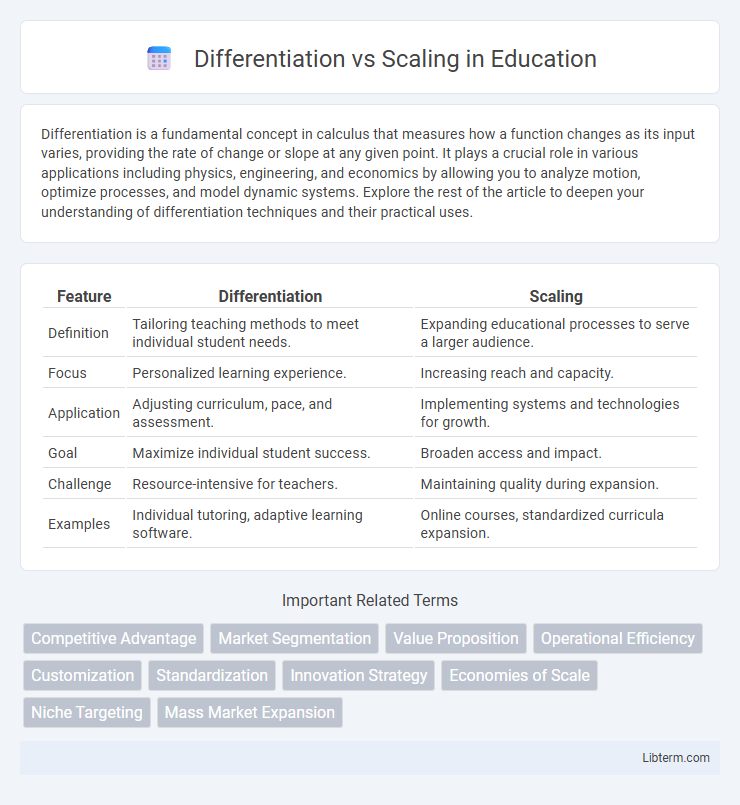Differentiation is a fundamental concept in calculus that measures how a function changes as its input varies, providing the rate of change or slope at any given point. It plays a crucial role in various applications including physics, engineering, and economics by allowing you to analyze motion, optimize processes, and model dynamic systems. Explore the rest of the article to deepen your understanding of differentiation techniques and their practical uses.
Table of Comparison
| Feature | Differentiation | Scaling |
|---|---|---|
| Definition | Tailoring teaching methods to meet individual student needs. | Expanding educational processes to serve a larger audience. |
| Focus | Personalized learning experience. | Increasing reach and capacity. |
| Application | Adjusting curriculum, pace, and assessment. | Implementing systems and technologies for growth. |
| Goal | Maximize individual student success. | Broaden access and impact. |
| Challenge | Resource-intensive for teachers. | Maintaining quality during expansion. |
| Examples | Individual tutoring, adaptive learning software. | Online courses, standardized curricula expansion. |
Understanding Differentiation and Scaling
Understanding differentiation involves recognizing how a product or service stands out through unique features, quality, or customer experience that create competitive advantage. Scaling focuses on expanding operations efficiently to increase output, market reach, or revenue without a proportional rise in costs. Both concepts are essential for sustainable business growth, where differentiation drives value creation and scaling amplifies market impact.
Core Concepts: What is Differentiation?
Differentiation is a business strategy that focuses on creating unique products or services that stand out from competitors by offering distinct features, quality, or brand reputation. Core concepts include innovation, customer-centric design, and value proposition enhancement to attract and retain target markets. Differentiation drives competitive advantage by emphasizing distinctiveness rather than competing solely on price or volume.
Core Concepts: What is Scaling?
Scaling refers to the process of increasing a company's capacity to handle growing demand without compromising performance or quality, often by expanding resources, infrastructure, or operations. It involves systematic adjustments that enable businesses to efficiently serve more customers or produce more output, typically through automation, standardization, or enhanced technology. Effective scaling ensures sustainable growth by maintaining operational efficiency while managing higher volumes of products, services, or transactions.
Key Differences Between Differentiation and Scaling
Differentiation emphasizes unique product features or services to stand out in competitive markets, targeting specific customer needs with innovation and quality. Scaling concentrates on expanding operational capacity and market reach efficiently to increase revenue and reduce costs through economies of scale. Key differences include differentiation's focus on uniqueness and value creation versus scaling's emphasis on growth volume and cost optimization.
Benefits of Differentiation in Business
Differentiation in business enhances competitive advantage by creating unique products or services that meet specific customer needs, increasing customer loyalty and enabling premium pricing. It drives brand recognition and reduces direct competition by emphasizing distinctive features, quality, or innovation. Companies employing differentiation often achieve higher profit margins through value-added offerings and stronger market positioning.
Advantages of Scaling for Growth
Scaling offers significant advantages for business growth by enabling companies to increase output and revenue without a proportional rise in expenses, leading to improved profit margins. It allows for the efficient allocation of resources and the ability to capitalize on economies of scale, reducing per-unit costs and boosting competitiveness. Furthermore, scalable businesses can rapidly adapt to market demand fluctuations, ensuring sustained expansion and long-term success.
Strategies for Effective Differentiation
Effective differentiation strategies emphasize unique product features, superior customer service, and targeted branding to create a distinct market position. Companies leverage innovation, quality enhancements, and personalized experiences to meet specific customer needs and foster brand loyalty. Implementing clear value propositions and consistent messaging ensures differentiation efforts translate into sustainable competitive advantage.
Best Practices for Successful Scaling
Successful scaling requires establishing standardized processes and creating modular systems that allow flexibility while maintaining efficiency. Implementing robust data analytics and continuous feedback loops ensures real-time monitoring and rapid adaptation to evolving market demands. Investing in scalable infrastructure and cultivating a strong organizational culture focused on innovation supports sustainable growth and seamless differentiation in competitive markets.
Challenges: Differentiation vs Scaling
Balancing differentiation and scaling poses significant challenges, as differentiation requires customization and innovation that can slow mass production and limit standardization. Scaling demands efficient processes and broad market appeal, often conflicting with the need for unique product features and personalized customer experiences. Managing these opposing priorities requires strategic alignment to maintain brand identity while achieving growth and operational efficiency.
Choosing the Right Approach for Your Business
Choosing the right approach between differentiation and scaling depends on your business goals, market position, and competitive landscape. Differentiation requires emphasizing unique value propositions and innovation to stand out, while scaling focuses on expanding operations, reaching a larger audience, and optimizing efficiency. Evaluating customer needs and core competencies helps businesses decide whether to invest in specialized products and services or pursue growth through increased market share.
Differentiation Infographic

 libterm.com
libterm.com